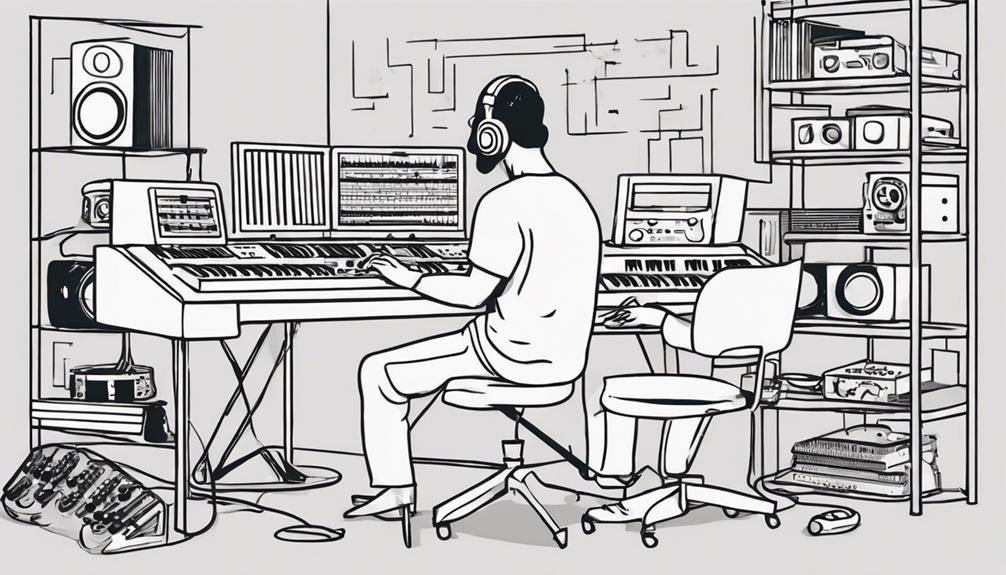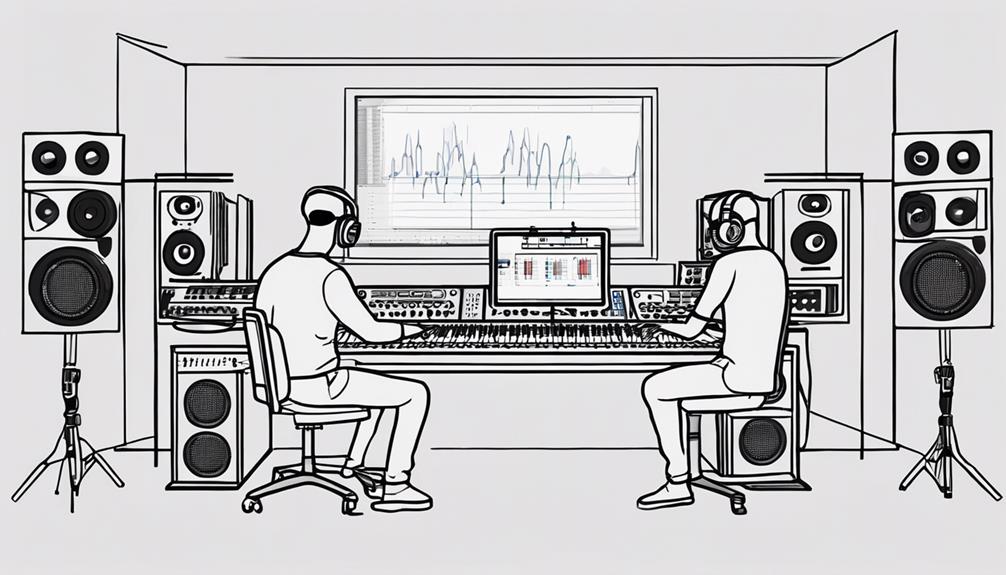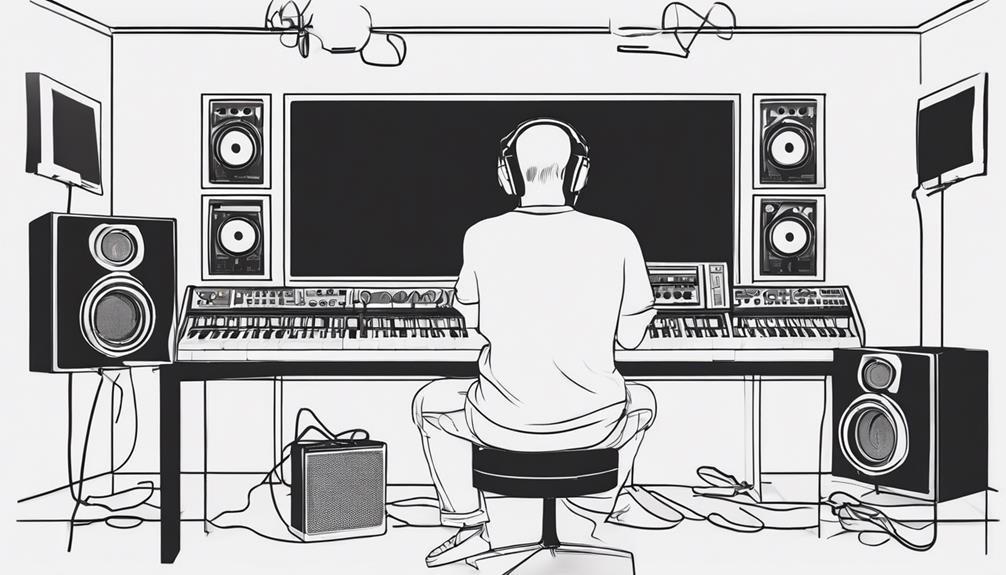To write a business plan for music production, start by crafting a compelling vision and mission statement. Identify your target market and focus on unique selling points and strategies. Breakdown your budget and expenses, then project revenue from music sales and performances. Establish a strong management structure and analyze your competition to adapt to the market. Guarantee efficient production facilities with state-of-the-art equipment and dedicated staff. By outlining your vision, strategy, finances, team, market analysis, and production operations, you'll set the stage for success in the music production industry.
Key Takeaways
- Craft a compelling mission and vision statement aligned with target market.
- Highlight unique selling points and innovative strategies for differentiation.
- Develop a detailed financial plan, including budgeting and revenue forecasting.
- Establish a strong management team focusing on artist development and financial management.
- Utilize state-of-the-art facilities, efficient operations, and diverse recording artists for success.
Vision, Mission, and Target Market
Crafting a compelling mission statement is essential for our music production company. We aim to articulate the purpose and values that drive our business forward. Our vision outlines the long-term goals and aspirations we have to grow and succeed.
By identifying our target market through thorough research on demographics, preferences, and behaviors, we can tailor our business plan to meet the specific needs and interests of our potential customers.
It is crucial to ensure alignment between our vision, mission, and target market. This alignment will create a cohesive and focused music production business plan that resonates with our audience.
Our mission statement reflects the essence of why our company exists, while our vision paints a picture of where we aim to be in the future. Understanding the demographics, preferences, and behaviors of our target market will enable us to cater our services effectively to meet their needs and build a strong connection with our audience.
Unique Selling Points and Strategies
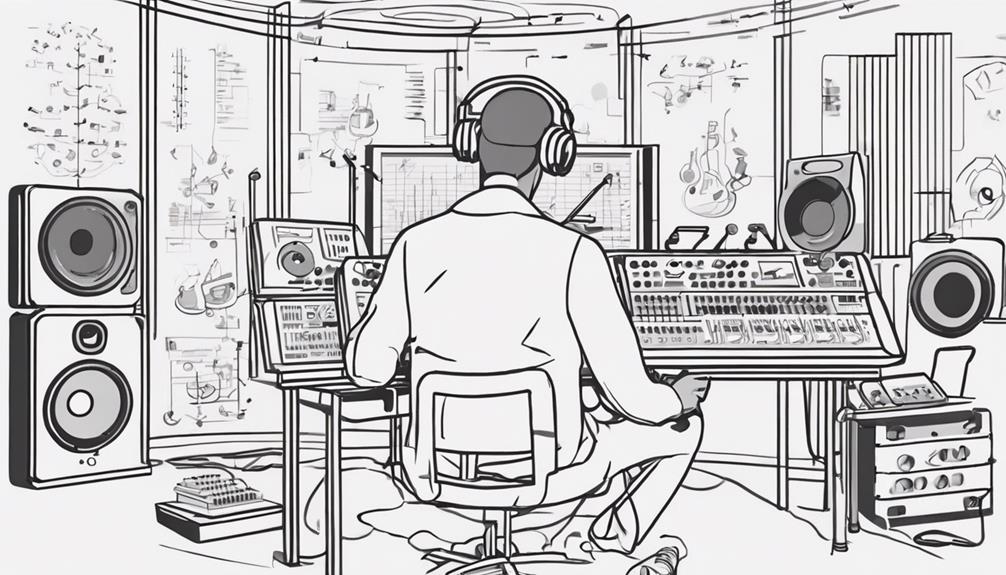
Highlight what sets your music production company apart from the rest. Showcase your specialized services, cutting-edge technology, or industry connections to stand out in the competitive market.
Develop tailored marketing and sales strategies to effectively communicate your unique offerings and attract customers.
Stand Out Strategies
To make your music production business distinct in a competitive industry, emphasize your unique selling points and implement innovative strategies.
Highlight your unique selling points, such as exclusive artist collaborations or cutting-edge production techniques. Develop innovative promotional campaigns to attract attention and create a buzz around your services.
Showcase your competitive advantage by offering specialized services like live recording sessions or virtual reality music experiences. Implement targeted marketing strategies to reach niche audiences, such as providing music for wellness programs or custom music for video games.
Stand out by offering value-added services like music licensing or sound design for films. By differentiating your business with these strategies, you can carve out a unique position in the market and attract clients looking for something special in their music production experience.
Distinctive Selling Points
Differentiating your music production business relies on pinpointing and capitalizing on your distinctive selling points and strategic approaches.
To stand out in the competitive music production industry, it's vital to highlight your unique selling points, such as innovative production techniques, cutting-edge technology, and exceptional customer service. Showcase your strengths by emphasizing your company's reputation for delivering high-quality sound production and successful music projects.
Consider specializing in a niche music genre or offering personalized production packages to cater to specific client needs. By focusing on these aspects, you can create competitive advantages for your business, like exclusive partnerships with top artists or a track record of producing chart-topping hits.
Financial Plan and Projections
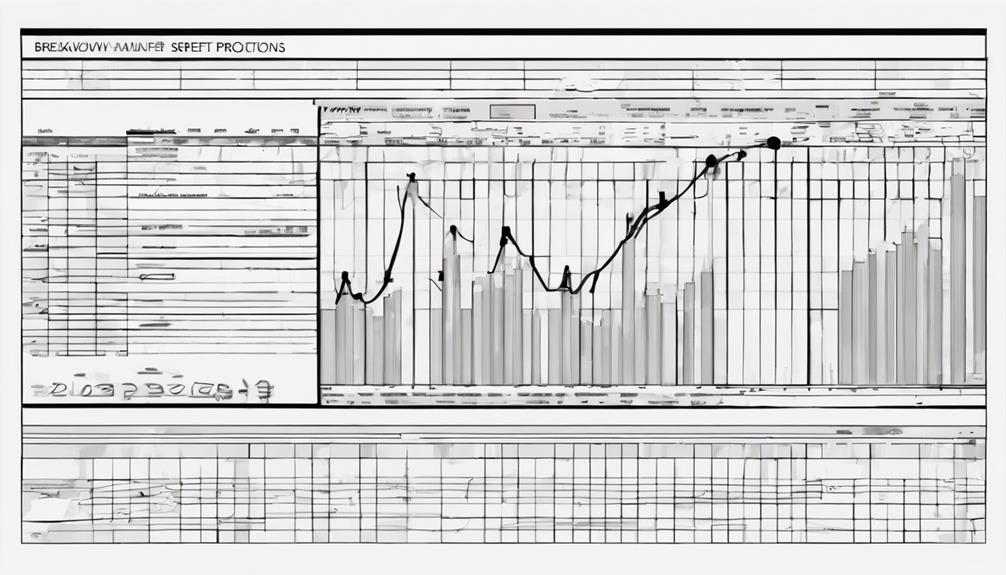
When creating your business plan for music production, make sure to include detailed budgeting for expenses and revenue forecasting. These elements will help you map out your financial strategy and demonstrate your expected profitability to potential investors.
Budgeting for Expenses
When preparing your business plan for music production, budgeting for expenses is crucial in creating a solid financial plan and projections. To guarantee the success of your music production business, you must carefully consider all costs involved. Below is a breakdown of key expenses to include in your detailed financial plan:
| Expense Category | Estimated Amount ($) | Notes |
|---|---|---|
| Studio Time | $5,000 | Cost per hour for recording sessions |
| Equipment | $10,000 | Including instruments and software |
| Marketing | $3,000 | Promotional activities and advertising |
| Personnel Salaries | $6,000 | Compensation for staff |
Revenue Forecasting
To create a successful financial plan and projections for your music production business, it's essential to focus on revenue forecasting. This involves projecting income from various sources such as music sales, live performances, royalties, and licensing agreements.
When developing your financial projections, make sure you include detailed estimates of expenses, revenue streams, and conduct a break-even analysis for accurate forecasting. By utilizing industry benchmarks, historical data, and monitoring market trends, you can forecast revenue growth and potential challenges within the music production business.
Consider conducting sensitivity analysis to prepare for different scenarios and account for uncertainties or changes in the market. Accurate revenue forecasting is vital not only for securing funding but also for making strategic decisions that ensure the financial health and sustainability of your music production business.
Management Structure and Team

The management structure and team at DJA Records Corp. play a crucial role in executing successful projects and driving the company's strategic goals. With a hierarchical organizational structure in place, label VPs report directly to the President and Board of Directors.
The leadership team, led by President Brian Chapple and COO/CFO Jason Dove, includes Senior Vice Presidents focused on artist development, financial management, and niche genres. This team composition guarantees a tailored approach to genre-specific growth and project execution.
Staff members are carefully selected for their expertise in project production and marketing, with some boasting Grammy and Stellar Award nominations. At DJA Records Corp., the management team's primary focus lies in advancing artist development, overseeing financial management, and fostering niche genre growth.
This structure is meticulously designed to support the company's strategic goals and drive successful project outcomes.
Market Analysis and Competition
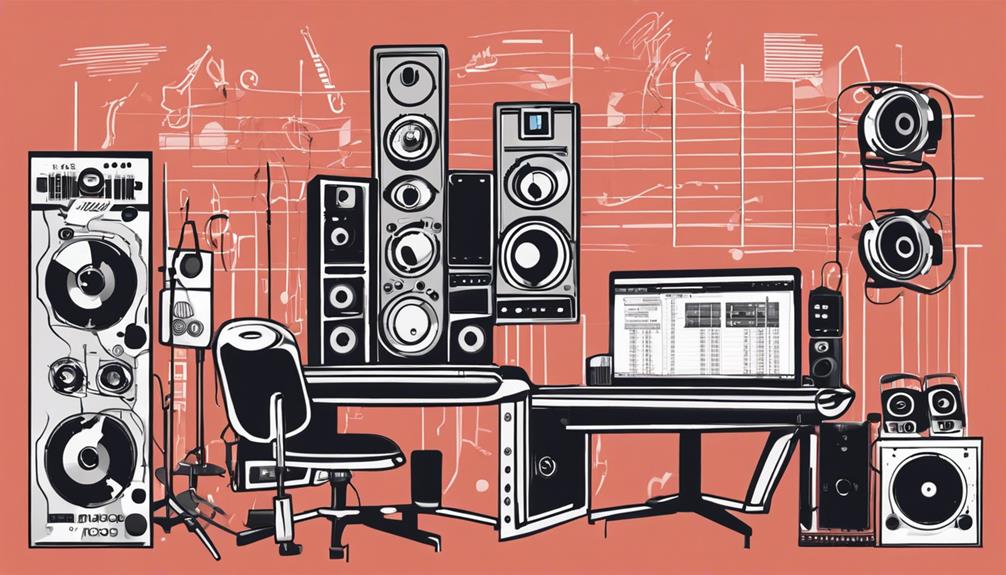
In analyzing the market and competition for music production at DJA Records Corp., it's essential to target specific markets such as the US, Japan, UK, Germany, and South America. Conducting a thorough market analysis is pivotal to understand consumer preferences and trends.
With the growing prominence of digital distribution in the music industry, it's imperative to adapt and leverage this platform to reach a wider audience and compete effectively.
Considering that independents held a significant market share in the US record business, tapping into this segment can be advantageous. Partnering with high-quality recording facilities like Sharp Recorders in Miami ensures the production of high-quality music projects.
Securing successful recording artists early on and committing to their success by releasing four projects per label in the first two years can pave the way for a strong market presence.
Production Facilities and Operations
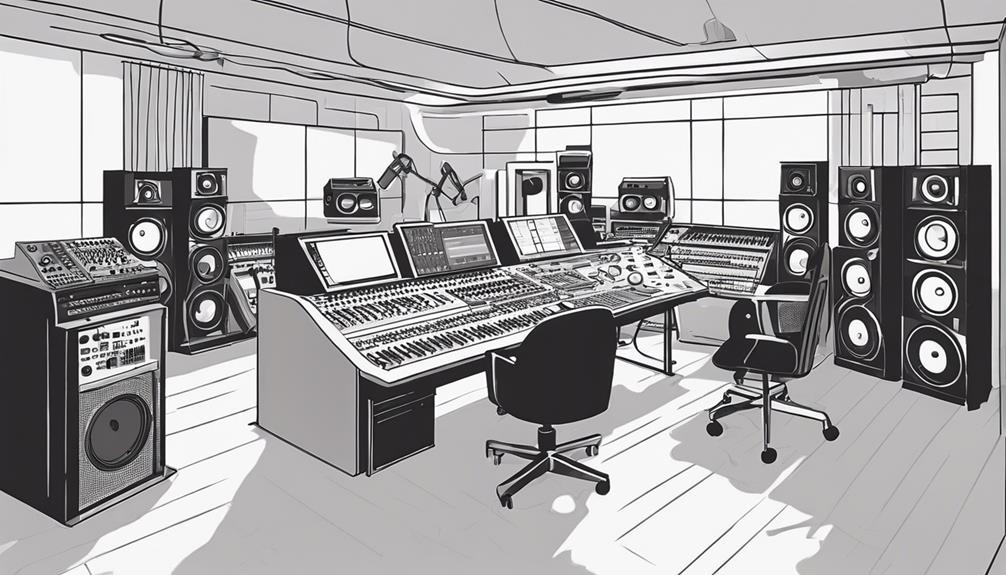
Operating at Sharp Recorders in Miami, DJA Records Corp. utilizes a state-of-the-art facility equipped with top-tier recording equipment for its music production needs. The company strategically manages studio time to optimize project production costs while ensuring high-quality output for its music projects. By securing successful recording artists, DJA plans to release four projects from each of its four distinct labels within the first two years. Sharp Recorders in Miami, a multi-million dollar facility, serves as the primary production hub for DJA, reflecting the company's commitment to artists and early success.
| Production Facilities | Operations | Recording Artists |
|---|---|---|
| Multi-million dollar facility | Strategic studio time management | Secured successful artists |
Frequently Asked Questions
How Do You Write a Business Proposal for Music?
When writing a business proposal for music, outline your company overview, target market, competitive analysis, and unique selling proposition. Detail your marketing and sales strategy, operational plan, management team, and financial projections to showcase viability.
How Do I Start My Own Music Production Business?
Ready to launch your music production business? Identify your niche, create a detailed business plan, invest in high-quality equipment, network with industry pros, and stay informed on trends. Success in this competitive market requires dedication and strategic planning. Leverage online platforms and social media to build your brand and reach a wider audience. Understanding how to start a music business also means continuously improving your skills and staying adaptable to the ever-evolving industry landscape. With persistence and a clear focus, you can establish a thriving presence in the music production world.
What Are 7 Steps to a Perfectly Written Business Plan?
To craft a stellar business plan, start by clarifying your objectives and market niche. Conduct thorough research, create detailed financial projections, devise a robust marketing strategy, and outline operational processes. With these steps, you'll set your music production business up for success.
Do Musicians Need a Business Plan?
You're exploring a sea of opportunities. To chart a course towards success, musicians like you need a business plan. It's your compass, guiding decisions, attracting support, and shaping your music career's future.
Conclusion
Now that you've crafted your business plan for music production, you're ready to hit all the right notes in the industry.
Like a well-tuned instrument in the hands of a skilled musician, your plan will guide you through the highs and lows of the business world.
Stay in harmony with your vision, fine-tune your strategies, and rock the stage of success with confidence and creativity.
The spotlight is waiting for you to shine!



